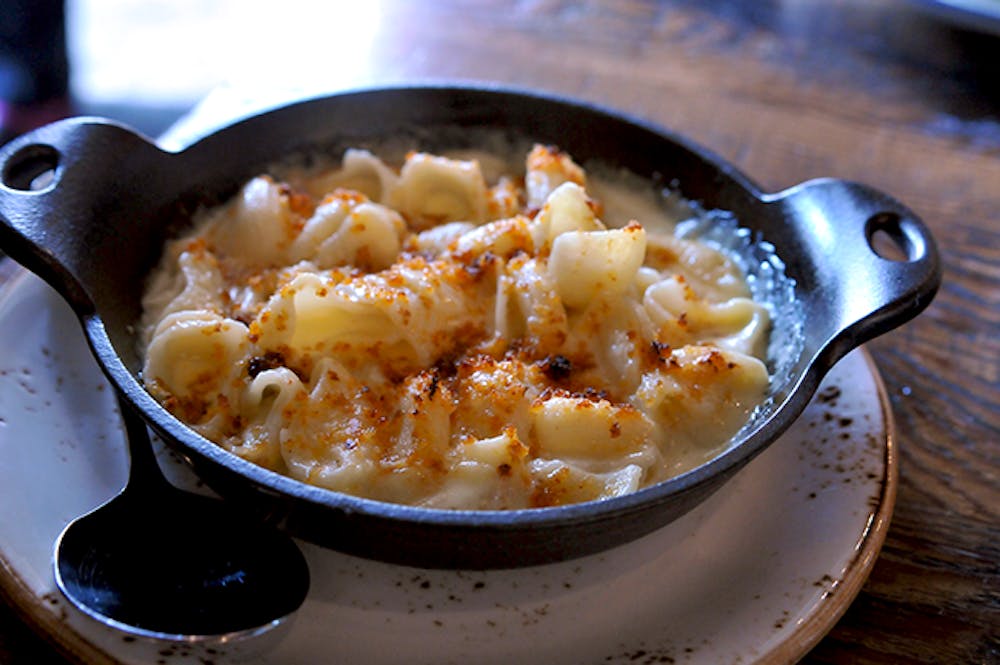[media-credit id=6898 align="alignright" width="300"][/media-credit]
Street: What is your culinary background? How did your food get its southern influence?
Kevin Sbraga: Both of my parents were bakers, so I grew up in the bakery. And my father is African American, so I grew up eating a lot of soul food. That was one of the cuisines that I really remember as a child. I remember cooking it with my grandmother, and just eating her baked chicken, and collared greens, and sweet potatoes, and mac and cheese and just all of those awesome flavors. I really wanted to be able to return to those roots, but at the same time elevate them and not just do food from the past, but do food that’s currently happening down South.
Street: So did you travel down South before opening The Fat Ham?
KS: Yes. My first stop was Lafayette, Louisiana. From there I went to Avery Island, Louisiana, then to New Orleans. That whole Louisiana trip was about visiting Tabasco and learning about pepper sauce. Then from there I went to Nashville, and the rest of the team met me there. We spent two or three days in Nashville and just ate all over down there. Then we went from Nashville to Birmingham, Birmingham to Atlanta, Atlanta to Columbia, South Carolina and Columbia to Charleston.
Street: Why Philly?
KS: I grew up around here, only 15 miles away. I just feel like Philly is home.
Street: Why this particular location? Did you have college students in mind?
KS: Not initially. I just felt like it was a good location, and there was a lot of potential. It just so happened that it was around college students, though, and I felt like it was a place where college students could go to have a good time, eat really well and have some drinks—I wanted it to not just be a hangout bar, but a good place.
Street: Did this influence your decision to make a menu of small plates?
KS: That was not always the plan, it just kind of evolved into that. Originally, there’s something down south called “Meat and Three,” where you order your meat and then pick three sides, and that was one of my plans. And as I traveled down south I was paying attention to what was going on in the restaurants down there, and although most of them don’t do small plates, I felt like while we were traveling, what we all enjoyed most was sharing the food. And it really brought me back to the idea of supper. And supper down south is when a bunch of food just hits the table and everyone gets a little bit and kinda digs in. And that’s really what I wanted to capture.
Street: You’re also very involved in the Philadelphia community, hosting charitable dinners and redesigning the Eagles stadium menu. What’s your motivation?
KS: I grew up near here, and I feel like it’s my responsibility to be able to give back and do as much for the community as possible. It’s just a part of what we do as chefs; it’s a part of hospitality.
Street: How did you decide to go on "Top Chef?"
KS: Well the first time I applied it was really because I had been unemployed for 18 months, and was kind of desperate and just really wanted to get back to work and have my own kitchen. I applied and got turned down, and eventually started working again. And then next season popped up again, and I felt like I had to try at least one more time. So I tried one more time, and the rest is history.
Street: What influence has your “Top Chef” win had on your career today?
KS: Even last night, someone came up to me and said what a big fan of mine they were, and how much they loved “Top Chef.” It’s been three years, and people are still saying that to me! Another aspect is that it really helped me open my restaurant and get my name out there.
Street: What’s most important for us to know about The Fat Ham and your ideology as a chef?
KS: The Fat Ham is not just me; it’s the culmination of a group of people that really put the restaurant together, and bring it to life. From my GM down to the bartenders, down to my chef du cuisine and the managers, they’re really what make The Fat Ham what it is. A lot of the ideas are mine, and the standards are mine, but the ladies and gentlemen I work with have to execute them on a daily basis. I think a lot of times that gets overlooked, and that’s one thing that, to me, is just really important.

